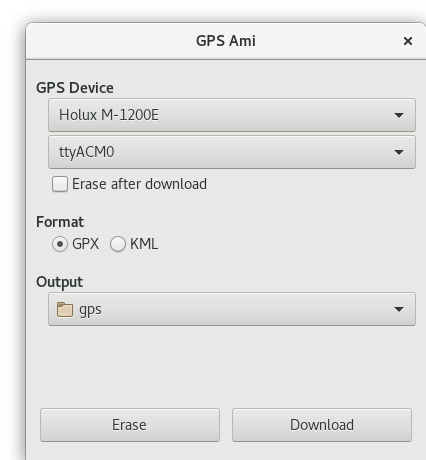But why automake? Cargo is nice.
Yes it is. But it is also limited to build the Rust crate. It does one thing, very well, and easily.
Although I'm writing a GNOME application and this needs more than building the code. So I decided I need to wrap the build process into automake.
Let's start with Autoconf for Rust Project. This post is a great introduction to solving the problem and give an actual
example on doing it even though the author just uses autoconf. I need automake too, but this is a good start.
We'll basically write a configure.ac and a Makefile.am in the top level Rust crate directory.
configure.ac:
AC_INIT([gpsami], m4_esyscmd([grep ^version Cargo.toml | awk '{print $3}' | tr -d '"' | tr -d "\n"]), [hub@figuiere.net])
AM_INIT_AUTOMAKE([1.11 foreign no-dependencies no-dist-gzip dist-xz subdir-objects])
Let's init autoconf and automake. We use the options: foreign to not require all the GNU files, no-dependencies because we don't have dependency tracking done by make (cargo do that for us) and subdir-objects because we have one Makefile.am and don't want recursive mode.
The m4_esyscmd macro is a shell command to extract the version out of the Cargo.toml.
VERSION=$(grep ^version Cargo.toml | awk '{print $3}' | tr -d '"' | tr -d "\n")
This does the same as above, but put it into VERSION
This shell command was adapted from Autoconf for Rust Project but
fixed as it was being greedy and also captured the "version" strings
from the dependencies.
AC_CHECK_PROG(CARGO, [cargo], [yes], [no])
AS_IF(test x$CARGO = xno,
AC_MSG_ERROR([cargo is required])
)
AC_CHECK_PROG(RUSTC, [rustc], [yes], [no])
AS_IF(test x$RUSTC = xno,
AC_MSG_ERROR([rustc is required])
)
Check for cargo and rustc. I'm pretty sure without rustc you don't have cargo, but better be safe than sorry. Note that this is considered a fatal error at configure time.
dnl Release build we do.
CARGO_TARGET_DIR=release
AC_SUBST(CARGO_TARGET_DIR)
This is a trick: we need the cargo target directory. We hardcode to release as that's what we want to build.
The end is pretty much standard.
So far just a few tricks.
Makefile.am
desktop_files = data/gpsami.desktop
desktopdir = $(datadir)/applications
desktop_DATA = $(desktop_files)
ui_files = src/mgwindow.ui \
$(null)
Just some basic declarations in the Makefile.am. The desktop file with installation target and the ui_files. Note that at the moment the ui files are not installed because we inline them in Rust.
EXTRA_DIST = Cargo.toml \
src/devices.json \
src/devices.rs \
src/drivers.rs \
src/gpsbabel.rs \
src/main.rs \
src/mgapplication.rs \
src/utils.rs \
$(ui_files) \
$(desktop_in_files) \
$(null)
We want to distribute the source files and the desktop files. This will get more complex when the crate grows as we'll need to add more files to here.
all-local:
cargo build --release
clean-local:
-cargo clean
Drive build and clean targets with cargo.
install-exec-local:
$(MKDIR_P) $(DESTDIR)$(bindir)
$(INSTALL) -c -m 755 target/@CARGO_TARGET_DIR@/gpsami $(DESTDIR)$(bindir)
We have to install the binary by hand. That's one of the drawback of cargo.
We this, we do
$ autoreconf -si
$ ./configure
$ make
# make install
This build in release and install it in the prefix. You can even make dist, which is another of the reason why I wanted to do that.
Caveats: I know this will not work if we build in a different directory than the source directory. make distcheck fails for that reason.
I'm sure there are ways to improve this, and I will probably, but I wanted to give a recipe for something I wanted to do.

